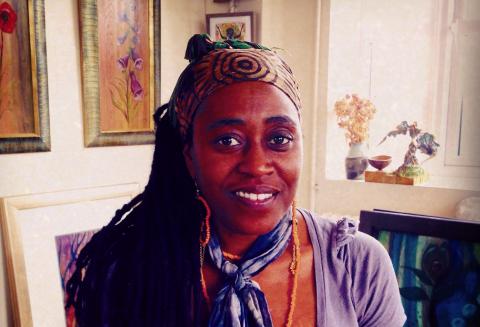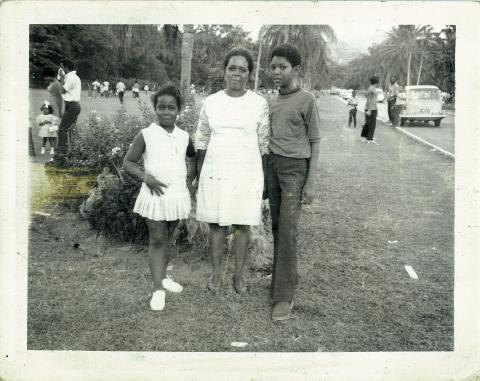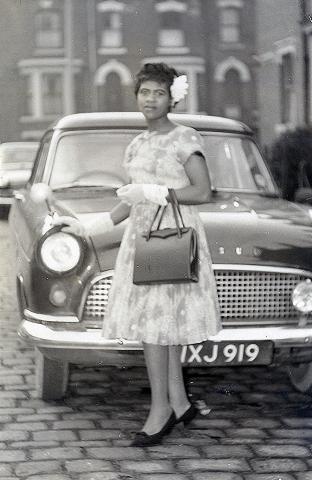Blog



A Dutch Pot Of Stories
You may also like
Leeds Inspired’s Adelle Stripe visits Leeds' poet Khadijah Ibrahiim in Chapeltown to hear about her latest collection.
"Khadijah Ibrahiim’s new poetry collection, Another Crossing, tells the stories of an individual life, a family, the communities of Chapeltown and Harehills, and of the crucial moments in the making of Leeds as a place where cultures met in the late 1970s.
The follow up to her 2008 debut Rootz Runnin’, the book tells of a period in the city’s history when teenagers were excluded from school for growing their dreadlocks, of the bonfire night riots, police harassment and racism. But it also sheds light on an era when black people in Leeds were creating their own culture in music, dance, and dress, all shaped by influences from the Caribbean, Black American music and British punk to create something unique.
The poems recreate the rooms of 56 Cowper Street, Ibrahiim’s Jamaican grandparents’ home of black pride and Victorian respectability, a house with a forbidden attic whose religious significance only became clear long afterwards. They also revisit her mother’s house on Gathorne Mount, a place that moved to the looser beat of reggae, where there was strict discipline, love, good food – and blues parties in the cellar.
Published in October by Peepal Tree Press and supported by Leeds Inspired, Khadijah Ibrahiim is currently developing a performance piece based on the collection. Working in collaboration with musician Chris Campbell, Joe Williams and the choreographer David Hamilton, it takes place at the West Yorkshire Playhouse as part of Black History Month on October 22nd.
Walking up Harrogate Road to meet Khadijah Ibrahiim, past the building that once housed The Silver Tree Club, I am reminded of hot summer nights listening to Tony Calypso’s DJ sets at The Hayfield, and the dawn rising after late sessions at Cowboy’s Blues where Sleng Teng played at full volume under a swinging red light. Looking down towards the city I recall Ian Duhig’s poem Róisín Bán that tells of ‘a white rose town in love with roads’, and how the routes across Sheepscar Interchange were originally built on foundations of pulped paperback books, their remains still hidden under the highway that leads into Chapeltown. One of the great things about poetry is that it can change the way you think about a place forever.
Today the streets are busy enough, with shops, cafes and food stores selling the sort of delights we can only dream of out in the sticks. Plantain, Supermalt, cheap coconut milk, bright scotch bonnet peppers, Peanut Punch, salt fish, callaloo, Canei wine, coriander and green chillies. It makes you hungry just thinking about it. Chapeltown is a much mythologised place. Drawing on a rich and diverse heritage that continues to this day it is perhaps one of the most fascinating areas in Leeds.
Towards the brow of the hill, tucked away behind the Mexboroughs is a tall building surrounded by a building site. I make a tentative knock on a top floor door. David Hamilton, co-founder of Phoenix Dance Company, invites me into their studio. I sit on a stool and watch the opening section of Khadijah’s performance, where she re-creates the dance floor of a shebeen. Winding barefoot across the parquet floor to Tapper Zukie’s MPLA at full volume, the effect is immediate.
For those who haven’t heard of Khadijah, she’s an important person in Leeds’ literary map. She’s the Artistic Director of Leeds Young Authors (who appeared in the acclaimed film We Are Poets). It is a group that she founded and which cultivates the next generation of poets and performers in the city. Hailed as one of Yorkshire’s most prolific poets by BBC Radio, she has appeared alongside the likes of Linton Kwesi Johnson, Lemn Sissay and Benjamin Zephaniah. She is also a literary activist, researcher and educator. In 2013 she was amongst several poets invited to Buckingham Palace, where the Queen and Duke of Edinburgh honoured the work of contemporary British poetry.
Image

Khadijah Ibrahiim (2014)
We sit overlooking the horizon of Scott Hall Road and drink peppermint tea. She has the kind of voice that lights up a room. Her waist-length locks are tied up in a piece of fabric that she has been practicing taking on and off with David Hamilton a hundred times already today as part of her performance. He’s trying to teach her how to move like a graceful bird. It’s not the easiest move. Khadijah keeps breaking out into laughter: “I can’t make my elbows move like that! They’re arms, not wings!”
I ask her if this is the first time she’s created a piece of performance on this scale?
“You know, I actually write for performance but it’s something that I very rarely get to explore as a poet,” she explains. “Really my work has been focused on young people, such as Leeds Young Authors which started really with my interest in poetry and performance. I had experience of working with young people in the past. I worked in youth hostels before I went to university and at Women’s Aid. But I always used my creativity hopefully to inspire them. So it was always a passion to be able to take this a step further.”
Before I came to speak to Khadijah I’d been impressed by a talk she gave at TedXBradfordWomen in 2013, where she discussed the development of Leeds Young Authors and her own practice as a poet.
It was fascinating to hear her talk about her time studying for a BA in Arabic and Middle Eastern Studies, during that period she moved to the Yemen for a year and took her children with her. It sounded like a brave move. “The course let me be as creative as I wanted to be,” she recalls. “So my love for literature - which was buried away, I was always writing poetry, keeping journals, writing little plays and never showing to anybody - that all just came alive on that course. And I still use it, yes.”
She describes living in the Yemen as “like being in some biblical story of Moses. I was in Sana’a, the university had halls but they gave me a house because I had children. They were so lovely to me. They thought that it was a special thing that I was doing. You know, studying and having my children there. They went to school there, so they also had to learn the language. And we all conversed. My daughter was 6, my son was 13.”
I ask if the experience had a positive impact on her children? Khadijah laughs and rattles her spectacular silver bracelets that stack up upon her wrists. “They love the fact that they went and they really do appreciate that experience,” she says. “They often say it made them look at life in a different way. Yemen’s not a rich place, but there’s a way of life that you begin to appreciate and accept.”
Khadijah believes that she is still influenced by what she learned during that time. “It exposed me to a whole new way of thinking about writing,” she says. “We learned about the classic poets, such as Rumi, but also contemporary writers as well. One of my favourite books is Attar’s Conference of the Birds, but when it’s translated you don’t appreciate the beauty of the language. But other influences have gone into the poems, Tayib Saleh’s Season of Migration in the North, even Sufi mystics, their philosophy and ideas.”
Khadijah Ibrahiim was born in Leeds but is from Jamaican heritage, something that she expands upon in her poem Homespun: “I was split between / my mother’s looser apron strings / and Grandma’s homespun rules / of do’s and don’ts and decency / when chores were regular and never shirked / for skipping ropes, jacks and hot rice”.
Image

Khadijah's Auntie Violet and children in Jamaica (1960's)
Spending time between her grandparents’ house on Cowper Street in Chapeltown and her mother’s at Gathorne Mount in Harehills she revisits her life in the two houses, writing a poem set in every room. “I come from a tradition where your grandparents can have you,” explains Khadijah. “So I wouldn’t just go for a visit, I’d be there for a year sometimes. You never knew. So I had two homes, which was quite interesting because the way that my grandparents were and the way that my mother was were very different.”
Her grandmother was, according to Khadijah, “A beautiful woman who really respected royalty. It was all about the Queen and the Queen Mother. Very traditional. She was from Kingston and grew up under that ‘proper’ British country thing. And things were in order. You set the table in a certain way, even the way you dressed – things had to match. According to the seasons you had to wear short socks in the summer, long socks in the spring. You wore petticoats, they had to match and they came from Marks and Spencer’s. You had your Sunday Best. There were these rituals that were British but also Caribbean.”
Recounting a recent newspaper article that she recently found about her grandfather (she has many stories of his political activism in the area) she tells me about a key event that happened during the winter of discontent.
“He was a very political man,” she remembers. “He didn’t tolerate nonsense from anybody. He was also very passionate. In the 70s he campaigned a lot against racism and injustices - things that other people probably ignored. The refuse collectors weren’t emptying the dustbins for weeks and weeks. The place was running with rats. It was disgusting. Stuff that I probably wouldn’t have noticed back then. But he would have noticed. He led this campaign to get the dustbins emptied. Nothing happened. So he told the community ‘take your dustbins out onto Chapeltown Road and empty them’. It was where The Hayfield used to be, and where the library is now. He told them to dump it on that road and said ‘I guarantee that it will be cleared up’. So, direct action. Apparently they piled it up like a bonfire, and of course it was removed.”
During this time the differences between the two generations of her family became apparent. Her mother started holding blues parties (shebeens) in the basement of the house. “If you think about Leeds in the 70s, you had this African Caribbean community that was the first generation who were born here,” recalls Khadijah. “And there was an aftermath of racism in the atmosphere. And so my mother and family talked about Teddy Boys chasing them, and so they made their own entertainment. It wasn’t unusual for someone to have a blues or events in their home.”
Recalling some of Chapeltown’s blues clubs over the years - such as Cliff’s, Sunny’s, and Darky’s – Khadijah reveals how they were often started up out of necessity: “The entertainment was kept in the area. And my Mum was a big part of that. But she was also known for her cooking. So whilst I just thought that Mum had lots of friends, really what happened was that they came to get something to eat.”
Rastafarianism played a big part in Khadijah’s life as a young woman, but she is equally as enthusiastic about punk bands such as The Clash, The Jam or the Sex Pistols, who once played a gig at the Fforde Green pub. It was a regular occurrence to listen to punk records at the Jubilee Club on York Road, and Rock Against Racism also was a prominent movement in the area. Part of her performance on the 22nd also looks at this aspect of Chapeltown life. Many of her teenage experiences have fed into the new collection, and Khadijah recalls some of the changes that have taken place geographically since the 1970s. “The area that we lived in (the Gathornes) was demolished. I wanted to re-paint that for people to remember.”
Is poetry, I wonder, helping her trace the history of the area, perhaps, in a sense, a way of rebuilding the lost streets of her childhood?
“What I was realising as I was getting older was that as time changes it’s not just the buildings, but if you demolish a whole area the community is lost,” she responds. “And that’s what happened. I felt a real sadness about that because all of the people we grew up with were scattered across not just Chapeltown, but Harehills, Roundhay, and further away. And some you’d never see again.”
On the front cover of Another Crossing is a black and white photograph of Khadijah’s mother from 1960, wearing her Sunday Best, with white dress gloves, a flower in her hair, stood outside her home on the Gathornes, a street with cobble stones, terrace houses and net curtains. I wonder if there are many photographs of those streets still in existence? “It has been hard, because I’ve been searching for photographs from that time. And what was also sad for me was that not only had all of our streets been demolished, but my primary school was too - only the railings and walls remain. Then there was a campaign to knock down my middle school for years, but that became Shine. I went to Intake High School. That’s been rebuilt as West Leeds Academy. I also spent two years at Primrose Hill High School. They knocked that down, too.
Image

Khadijah's mother in Leeds (1960)
“So, what do you do with all of that rubble?,” she concludes. “It’s stories – it is the past, our history. For us it’s ‘do you remember back in the day?’ but eventually those people will stop remembering. It needs to be recorded.”
Khadijah will be performing poems from Another Crossing at this year’s Black History Month on October 22nd at West Yorkshire Playhouse. Featuring the talents of Leeds Young Authors, poet Malika Booker, and MC for the evening - poet and live artist Dorothea Smartt, Another Crossing transforms the traditional poetry reading into a riot of music, movement and images, bringing the beats to life. This live event is also the official launch for the book. Tickets are £6/£5 concessions + booking fee from the WYP box office.
Peepal Tree Press are also hosting free writing workshops which explore personal memories and community histories throughout the month.
Call 0113 2451703 for details.
Copies of Another Crossing will be available via all good booksellers at £8.99 from 20th October 2014